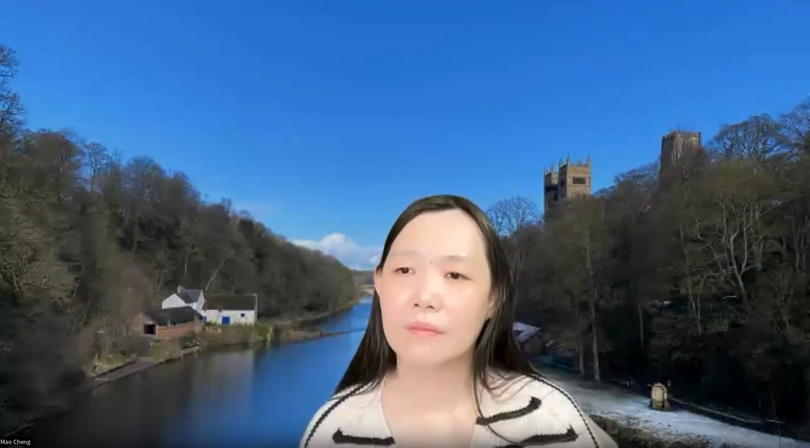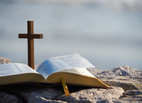Cheng Mao, a doctoral candidate at Durham University, said that John C. H. Wu's thought forms a coherent system of natural law that reconciles his lifelong tensions between scholarship and faith, East and West, and classical and modern ideas.
On May 30, the Gospel and Modern China magazine hosted an online lecture entitled "Beyond East and West: John C. H. Wu's Faith, Scholarship, and Life" by Cheng Mao, a PhD candidate from Durham University's Department of Theology and Religion, who presented her doctoral research on John C. H. Wu (1899-1986), a prominent Catholic layman, jurist, and a Chinese intellectual. Cheng argued that Wu's thought forms a coherent system unified by natural law, which served to reconcile the foundational tension in his life between scholarship and faith, as well as conflicts between East and West, and classical and modern ideas.
Cheng began by recounting Wu's formative years. Born into a merchant family in Ningbo, Wu was educated in both Chinese classics and Western sciences. His first exposure to Western thought came through missionary translations of Chinese texts, which presented Chinese philosophy and Christian ideas as naturally compatible. This early experience, Cheng explained, instilled in him a lifelong drive for synthesis. His family life, marked by a traditional yet affectionate marriage and the strong moral character of his non-Christian father, grounded him in a belief in inherent human goodness, a concept he would later connect to the principles of natural law.
The lecture then turned to the influence of Chinese philosophy on Wu's thinking. Cheng described Wu's worldview as holistic, shaped by the principle of "heaven and man as one" rather than a Western-style division of body and soul. For Wu, core concepts like "harmony" were not static ideals but dynamic, creative processes. Cheng pointed out that in his early career, Wu blurred the distinction between the self-contained "nature" of Chinese thought and the transcendent, law-giving "nature" central to Western natural law, a point of confusion he would resolve later in life.
Wu's formal legal training and early career were marked by exceptional achievement. He earned a J.D. from the University of Michigan Law School in just one year before pursuing further studies with Europe's leading legal minds, including Rudolf Stammler. In the United States, he developed a 14-year correspondence with Supreme Court Justice Oliver Wendell Holmes Jr. and studied under Roscoe Pound at Harvard University. His early academic work sought to bridge the gap between empirical and conceptual legal theories and to reconcile the permanent and evolving aspects of natural law. Cheng noted that Wu often used language reminiscent of Daoism, expressed in Hegelian terms, to define natural law as a self-integrating unity.
Upon returning to China, Wu launched a brilliant but turbulent career in law and politics. He earned acclaim as a judge and president of the Shanghai Provisional Court and was instrumental in drafting both the Republic of China's civil code and its 1936 draft constitution. However, Cheng detailed how his efforts to balance Western individual rights with Chinese traditions drew sharp criticism. The immense pressure of his public roles, coupled with a period of personal indulgence, plunged him into a severe spiritual crisis as he struggled to align his ideals with the complexities of reality.
The decisive turning point came in 1937 with the outbreak of the Sino-Japanese War. Confined to Shanghai, Wu immersed himself in the writings of Cardinal Newman, Dante, and St. Thérèse of Lisieux, an experience that prompted his conversion from Methodism to Catholicism. This spiritual rebirth transformed his family; Cheng recounted that 51 relatives, including his wife, eventually converted to Christianity. During the war, Wu undertook a translation of the Psalms and the New Testament into classical Chinese at the request of Chiang Kai-shek, a project that profoundly shaped his theological perspective.
In his later years, Wu's focus shifted from public life—which included a post-war appointment as minister to the Holy See—back to the world of academia. With positions at universities in Hawaii, New Jersey, and Taiwan, he finally had the intellectual freedom to synthesize his life's work. It was during this period, Cheng argued, that Wu fully integrated his legal, philosophical, and spiritual insights into a comprehensive system.
In her conclusion, Cheng detailed this final synthesis. Wu adapted the Thomistic legal framework to organize his thought, presenting a continuum of eternal law, natural law, and human law. In his model, natural law acts as the vital link between the immutable divine order and variable human legislation. He also offered a unique Christological interpretation of Divine Law, seeing it as embodied in the person of Christ. Wu used this structure to integrate Chinese philosophy, aligning Daoism with Eternal Law, Confucianism with natural law, and Legalism with human law. Through this framework, Cheng concluded, Wu found a way to resolve the great conflicts of his life, creating a unified vision that harmonized East and West, faith and reason.












